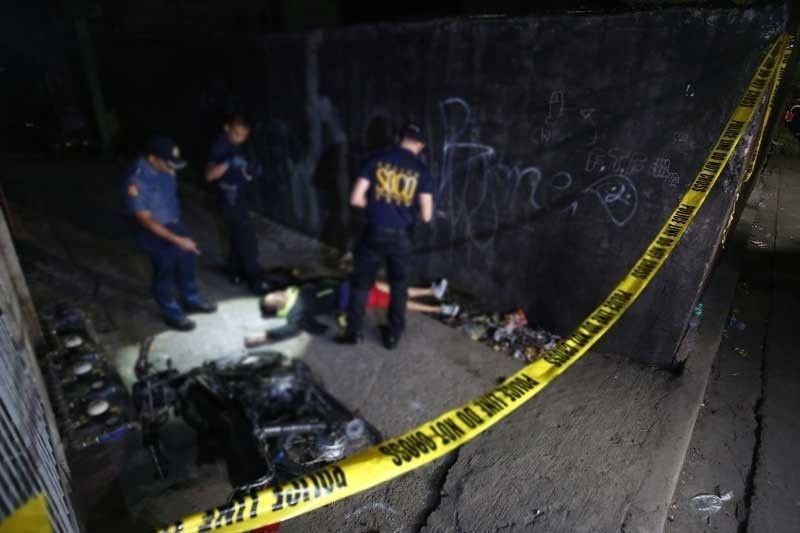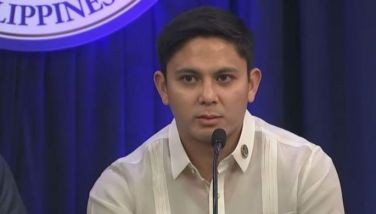SolGen to ICC: Don’t rush us on drug probes

MANILA, Philippines — The International Criminal Court (ICC) is rushing the Philippine government into prosecuting suspects in the killing of thousands of alleged drug offenders in the so-called war on drugs of the previous Duterte administration, according to Solicitor General Menardo Guevarra.
In an interview with “The Chiefs” on One News Thursday night, Guevarra said his office has made it clear to the ICC that it is “interfering” in the country’s domestic affairs by ordering its prosecutors to resume their investigation on the drug war killings.
“We showed (in our appeal) the general situation that we are conducting our own investigation in accordance with the rules of procedure. What is happening is the ICC is rushing us into filing cases in court for trial,” Guevarra said in Filipino.
“That is not our process here. We need to undergo the process of fact-finding and investigation because we are giving respondent police officers due process,” Guevarra said.
The solicitor general said they have rejected the ICC pretrial chamber’s findings that the domestic investigations on the drug killings were unsatisfactory, noting that 12 cases of extrajudicial killings have already been filed before Philippine courts or prosecutor’s offices.
“So we will arrive at its conclusion. But let us not rush this. Do not put the cart before the horse. We have our own processes and we have to follow that,” Guevarra said.
But international law expert Romel Bagares said the cases filed in courts only have patrolmen and other low-level police officers as respondents, and not generals or the president who ordered the drug crackdown.
The investigations at home – which led to the conviction of four dismissed Caloocan police officers for killing, torturing and planting evidence on teenagers Kian delos Santos, Carl Angelo Arnaiz and Reynaldo de Guzman by two Caloocan trial courts and a Navotas court – are just a mere drop in the bucket, according to Bagares.
“The ICC is designed to try the most responsible persons. Not the patrolmen, not the sergeants. It’s going to be the brains who designed the whole policy. But who is being investigated in the Philippines? Convictions of low-level foot soldiers will not hold,” Bagares told The STAR yesterday.
While admitting that the investigation currently has yet to implicate high ranking police officers, Guevarra is not discounting the possibility that the probe will eventually point to police generals or even former president Rodrigo Duterte.
“As to the non-exclusion of superior police officers, we explained to the ICC that we started investigating those at the actual scene of the crime where there were people killed. In the process, we’re hoping there will be leads pointing to the higher-ups,” Guevarra said.
The former president was not investigated at the height of the drug killings as he had immunity from suit at the time, said Guevarra, who had also served as Duterte’s justice chief.
‘Colorful language’
Guevarra also defended Duterte’s off-the-cuff remarks in public ordering police to kill drug suspects, saying the chief executive was known for his “colorful language.”
During the One News program, Guevarra was asked about the implication of the 2021 Supreme Court ruling “Pangilinan v Cayetano,” which stated that despite the Duterte administration’s withdrawal from the ICC, he and his officials could still be prosecuted by the tribunal for crimes committed prior to the withdrawal.
Yesterday marked the fourth year of the Philippines’ withdrawal from the Rome Statute that created the tribunal based in The Hague.
“Even if it has deposited the instrument of withdrawal, it shall not be discharged from any criminal proceedings. Whatever process was already initiated before the International Criminal Court obliges the state party to cooperate,” the SC said in its ruling.
But Guevarra said this portion of the ruling was a mere “obiter dictum,” or a comment made in passing.
The solicitor general claimed this SC opinion does not run counter to the OSG’s legal position that the ICC no longer has jurisdiction over the Philippines after its withdrawal.
“That is not doctrinal. It is only that in the course of discussing the issue, the Supreme Court mentioned an obiter dictum. But that is not the main issue in that particular case. Thus, there is no inconsistency,” Guevarra said.
But Bagares said Pangilinan v Cayetano would prove crucial in the ICC case “because it is the very first decision anywhere else in the world that says the duty to cooperate does not rest in a formal proceeding before the pretrial chamber – it already begins at the point of the ICC preliminary examination.”
“We have many cases where obiter dicta in domestic cases became the main point in international tribunals. I think the ICC will take note of that case, and I’m sure that will figure in the determination by the appeals chamber,” he added.
- Latest
- Trending


























